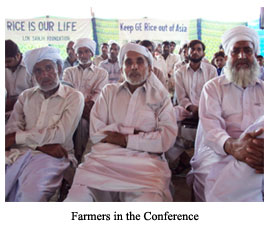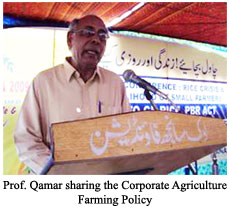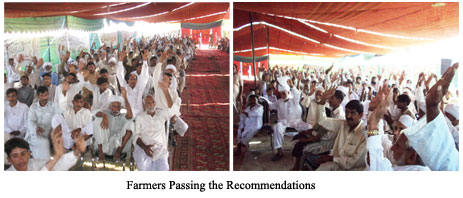Lok Sanjh Foundation press release | 15 October 2009
On October 15, 2009, the Lok Sanjh Foundation and the Pakistan Dehqan Assembly organized a conference on rice and the food crisis, focusing on small farmer livelihoods. More than 600 farmers, tenants, landless workers and partner organizations from different parts of the Sheikhupura region participated in the event, which was part of the Pesticide Action Network Asia and the Pacific (PAN AP) People's Year of Rice Action (YORA).
The three day programme, which ran from October 7-9, 2009, focused on genetically engineered (GE) crops and foods. Day one featured a seminar at the Ka Mu Giashuddin Milky Auditorium, in which Dr Hansen made two presentations on "The Role and Impacts of Genetic Engineered Crops in Food and Agriculture and the Commercialization of GE rice in Asia" and "Potential Implications of GE crops in Bangladesh: Golden Rice, Bt Brinjal, GE Papaya", followed by a question and answer period with the participants.
The recommendations, which came out of a year-long consultation process between farmers and key stakeholders, will be shared with members of the local government, the Provincial and National Assemblies, the Provincial and Federal Ministries of Agriculture and the Environment, the Agricultural Policy Institute and the media.
Recommendations
Following are the recommendations passed by the participants of the conference:
- We demand an immediate ban on Genetically Engineered crops and call on the Government of Punjab to withdraw the Agreement of Intent with Monsanto to introduce Bt cotton.
- Basmati growing areas should be protected from the introduction of all non-Basmati varieties including GE and hybrid rice.
- Food and agriculture policies must be premised on achieving self-sufficiency in food production through local food producers.
- Domestic food production must be prioritized to enhance livelihoods and counter the trend towards corporate and export-oriented agriculture.
- Adequate food stocks, resources for food production, equitable distribution of food and management must be community-based and controlled, giving priority to small producers and discouraging corporate ownership and control over strategic resources and production.
- Biodiversity-based ecological agriculture must be recognized by the government as a viable strategy for food security and poverty reduction for small and marginal farmers.
- The Irrigation Department must ensure the supply of approved amount of canal water. The canal banks should be lined immediately to avoid the water loss.
- Pakistan should entrench the Right to Food in the country's constitution and/or enact the national law in this respect. It must introduce enforceable mechanisms to protect, promote and fulfill the Right to Food.
- The government should introduce support price mechanisms to ensure fair prices for agricultural products. The support prices of all crops should be set in consultation with small farmers.
- Institutions like the WTO should be kept out of food and agriculture-related issues.
- The Seed Act, 2008 was prepared keeping in view the requirements of Article 27.3(b) of the TRIPS Agreement of WTO and ignoring the obligations of Pakistan as signatory to Convention on Biological Diversity (CBD) under UNEP and obligations of Pakistan as signatory to International Treaty on Plant Genetic Resources for Food and Agriculture (ITPGRFA) under UN-FAO. The Act should be modified to recognize the farmer's right to save and promote indigenous seeds and the freedom to reuse and exchange seeds.
- The Government should immediately withdraw the Corporate Agricultural Farming Policy and land should be distributed to landless and small farmers.
- Though there have been past attempts by governments to redistribute land among the poor, the measures proved to be inadequate in scale and extent. Reintroducing land reform schemes would be instrumental in reducing poverty and inequality. The issue of land reform should be addressed on a priority basis. The following points are of great importance in this regard:
- Free distribution of public lands to the landless peasants and other food producers
- Equitable access of agricultural resources
- Protection of tenancy rights of food producers
- Small-scale farmers should be provided with interest-free loans and agricultural extension services should be reactivated to address field/crop related problems.
- The agriculture research system must be revamped to focus on local seed varieties and to avoid the influence of MNCs. Research institutions should set the research agenda in consultation with farmers.
Dialogue Session
Muhammad Asim Yasin, while introducing GE Rice and the PBR Act, said that farmers have been growing diverse varieties of crops for generations with the aim of ensuring food security and conserving land resources; however this is slowly being eroded by MNCs and GE. He described how the Rice Research Institute Kala Shah Kakoo is in the process of conducting field trials of Golden Rice with the support of IRRI, threatening Basmati-producing areas and the cultural heritage of the country.
The proposed Seed Act of 2008 and the PBR Act are examples of how MNCs gain control over natural resources. While saving, bartering and selling of seeds may have greater implications for farmers' communities, they are deprived of ownership and dependent on the companies selling the seeds.
Prof. Qamar Mohyuddin explained the concept of corporate land grabbing and said that despite the serious concerns of farmers and civil society, the previous government approved the Corporate Agriculture Farming (CAF) policy. The present government pushed the policy further and announced an offer of six million acres of land to resourceful countries and MNCs. The announcement raised questions and concerns, especially considering the high degree of poverty and landlessness in the country.Concerns were also raised regarding climate change, the mechanization of agriculture, unemployment, hunger and poverty, as well as the situation of water security in Pakistan. The farmers were also anxious about land degradation as a result of land leasing, and the resultant social, political and environmental consequences.
Nek Muhammad, a farmer, described farmers' struggles for access to water, a fight that is ongoing with the Irrigation Ministry.
Ahmad Ali shared his experiences with the System of Rice Intensification (SRI). He has been working with Lok Sanjh for four years practicing BEA, and this year decided to allocate one acre of land for SRI. He said that SRI worked well with BEA because it offered space for worms, compost and green manure to enrich the soils. The crop is still in the field and will be harvested in late October. The condition of the crops grown under ecological methods is far better and has led to increased yield.
For more information on how you can get involved in YORA, please visit www.panap.net/yora. YORA is jointly organized by people's organizations in China, Japan, Korea, Cambodia, Vietnam, Thailand, Malaysia, Indonesia, Philippines, Sri Lanka, India, Pakistan, Nepal and Bangladesh in collaboration with the Pesticide Action Network Asia and the Pacific (PAN AP). It runs from 4 April 2009 to 4 April 2010.
Contact:
Lok Sanjh Foundation
Muhammad Asim Yasin, Managing DirectorTel: +9251 2101043
Fax: +9251 2210395 www.loksanjh.org














